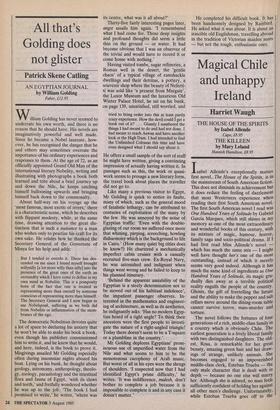All that's Golding does not glister
Patrick Skene Catling
AN EGYPTIAN JOURNAL by William Golding
Faber, £12.95
William Golding has never seemed to underrate his own worth, and there is no reason that he should have. His novels are imaginatively powerful and well made. Since he became a Nobel laureate, how- ever, he has recognised the danger that he and others may sometimes overrate the importance of his ordinary experiences and responses to them. At the age of 72, as an officially appointed Grand Old Man of the international literary Nobelity, writing and illustrating with photographs a book both learned and trite about a brief journey up and down the Nile, he keeps catching himself ballooning upwards and bringing himself back down to the commonalty.
About half-way on his voyage up the 'most famous, most exotic of rivers,' there is a characteristic scene, which he describes with flippant modesty, while, at the same time, drawing attention to the great dis- tinction that is such a nuisance to a man who wishes only to practise his craft for its own sake. He relates how he thanked the Secretary General of the Governate of Minya for his help and adds: But I tended to overdo it. There has des- cended on me since I found myself brought willynilly [a lot more willy than nilly] into the presence of the great ones of the earth an orotundity which I have come to define in my own mind as Nobelitis. This is a pomposity born of the fact that one is treated as representing more than oneself by someone conscious of representing more than himself. The Secretary General and I now began to use Nobelspeak, suffering as we both did from Nobelitis or inflammation of the mem- branes of the ego.
The democratic Nobelman devotes quite a lot of space to declaring his anxiety that he won't be able to make his book a book, even though his publisher commissioned him to write it, and he knew that he would, and here, indeed, is the book to prove it. Misgivings assailed Mr Golding especially often during insomniac nights aboard his boat. Lying on his bunk, he thought about geology, astronomy, anthropology, theolo- gy, zoology, parasitology and the intestinal flora and fauna of Egypt, 'with its claws and teeth,' and fretfully wondered whether he was up to the job. 'The book I had promised to write,' he writes, 'where was its centre, what was it all about?'
Thirty-five fairly interesting pages later, angst assails him again. 'I remembered what I had come for. Those deep insights and profound thoughts did seem a little thin on the ground — or water. It had become obvious that I was an observer of the trivial and would have to record it or come home with nothing.'
Having visited tombs, sugar refineries, a Roman well in the desert, the 'gentle chaos' of a typical village of ramshackle dwellings and their detritus, a pottery, a souvenir shop where the beauty of Neferti- ti was sold like 'a present from Margate', the Luxor Museum and the luxurious Old Winter Palace Hotel, he sat on his bunk, on page 139, unsatisfied, still worried, and
tried to bring order into this at least partly crazy experience. How the devil could I get a book out of it? . . . Glumly I numbered the things I had meant to do and had not done. I had meant to reach Aswan and have another look at the High Dam. I had intended to find the Unfinished Colossus this time and have even designed what I should say about it.
He offers a small sample of the sort of stuff he might have written, giving a convincing impression of actually having written it. In passages such as this, the work or quasi- work seems to presage a new literary form, the travel book about places the traveller did not go to.
Like many a previous visitor to Egypt, Mr Golding is quick to notice its faults, many of which, such as the general mood of fatalistic lethargy, can be attributed to centuries of exploitation of the many by the few. He was annoyed by the noise of Egyptian traffic: 'Even with the double- glazing of our room we suffered once more that whining, parping, screeching, howling disharmony which is the background to life in Cairo.' (How many quiet big cities does he know?) He chartered a mechanically imperfect cabin cruiser with a casually recruited five-man crew. Ex-Royal Navy, he was astonished and indignant when things went wrong and he failed to keep to his planned itinerary.
`Behind the apparent amiability of the Egyptian is a steely determination not to be moved out of his habitual indolence', the impatient passenger observes. In- terested in the mathematics and engineer- ing of architecture, as well as its aesthetics, he indignantly asks: 'Has no modern Egyp- tian heard of a right angle? To think their ancestors were the first people to investi- gate the nature of a right-angled triangle! Today there doesn't seem to be a T-square or a plumbline in the country.'
Mr Golding deplores Egyptians' prom- iscuous use of unpurified water from the Nile and what seems to him to be the monotonous cacophony of Arab music. But worst of all in his eyes were the shrugs of shoulders. 'I suspected now that I had identified Egypt's prime difficulty,' he writes. 'It was indifference, malesh, don't bother to complete a job because it is impossible to complete it and in any case it doesn't matter.' He completed his difficult book. It has been handsomely designed by Rainbird. He asked what it was about. It is about an irascible old Englishman, travelling abroad in the tradition of Victorian maiden aunts — but not the tough, enthusiastic ones.










































 Previous page
Previous page